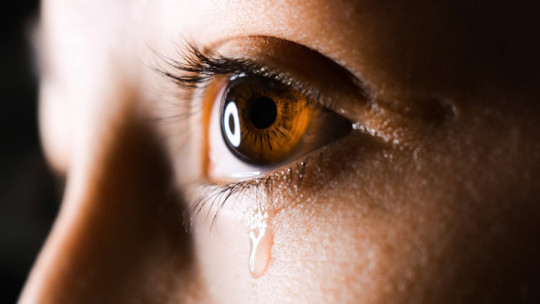We have all, at some point or stage in our lives, felt sadness Sometimes, it is impossible not to feel it, as some environmental events can cause it (grieving process, heartbreak, having to change home, etc.).
However, sometimes sadness is caused by our way of thinking or our way of behaving, especially when it lasts for a long period of time.
Tips to overcome sadness
Since sadness is an emotion that we all experience, in this article I have prepared a list of tips that will help you relieve it when it appears pay attention to the following lines because they may be useful to you.
1. Cry if necessary
We tend to think that it is not okay to cry, because socially it is not well regarded and it makes us weak people in the eyes of others; However, some studies indicate that Crying can be relaxing and can help you release endorphins , which are hormones related to pleasure. Some scientists claim that crying activates the parasympathetic system, and helps you recover from the stress and traumatic experiences you may experience.
It is not about forcing crying, but about feeling the emotion without avoiding it, as a rebound effect can occur, and thus experience greater pain. In addition, crying is good for the body’s health, as it helps release toxins, according to the theory of Dr. William Frey.
2. Accept sadness
As I mentioned in the previous point, avoiding emotions can cause a rebound effect and cause them to increase. That is why currently, More and more psychotherapeutic models are being applied that revolve around the acceptance of experience An example of this is acceptance and commitment therapy, which if you want to know in depth you can delve into this methodology in the article “Acceptance and Commitment Therapy (ACT): principles and characteristics”
Self-acceptance means treating ourselves kindly and recognizing that we are valuable. It is recognizing that we must love ourselves because if we do not respect ourselves, sadness can appear. If you want to know more about how to accept sadness in the article “Self-acceptance: 5 psychological tips to achieve it” we explain it to you.
3. Find your purpose
When we do not find meaning in our lives, we are likely to feel great sadness and live immersed in an existential void. A place where we do not see the future clearly and we don’t know ourselves
Therefore, to be happy and fight for one’s personal development, it is necessary work on self-knowledge and find out what motivates us. On that path towards our objectives is where our happiness is found.
4. Fight for your goals
Therefore, fighting for goals helps us overcome sadness and enjoy greater well-being, because when we are in contact with ourselves and our desires, our self-motivation increases
Now, these desires must be realistic, and we must not only have long-term objectives in mind, but short-term goals are just as important to keep us active throughout the process.
5. Do sports
Physical exercise is one of the activities that most promotes people’s well-being. Not only is it healthy at a cardiovascular level or to improve physical appearance, but it produces happy chemicals such as endorphins or serotonin which are associated with a positive mood and greater emotional well-being.
Studies suggest that practicing sports and physical activity helps us be happier, reduce stress and improve our self-esteem. In the article “The 10 psychological benefits of practicing physical exercise” you can find more information about these advantages.
6. Go outside
Studies suggest that going outside is good for our mental health. Vitamin D, which is stimulated by sunlight, favors the activation of the enzyme hydroxylase 2 (TPH2) which converts tryptophan into serotonin in our brain
Other studies suggest that going outside is key for patients with depression, as it produces significant improvements in their recovery.
7. Do something you like
Whether reading, swimming or playing cards, the activities we like cause us to release dopamine and many other neurotransmitters related to pleasure and happiness (endorphins, serotonin, etc.). The activities that we like the most allow us to stop for a while and give way to sadness.
8. Socialize
If going out and doing what we like is good, it is even better if we do it in company. Studies suggest that socializing and having friends It is essential for our mental health To meet new people, you can simply go to the yoga classes in your town or the gym, and you will see how you make new friends.
9. Practice Mindfulness
Mindfulness is an Eastern practice that has been applied in recent years in the clinical and psychotherapeutic field for its benefits for mental health. Use meditation as a technique to be in the present moment, accept our internal and external experience, improve the capacity for self-awareness and adopt a non-judgmental mindset
To learn to practice Mindfulness you can attend one of the courses that we present in our article “The 5 best Mindfulness courses and workshops”
10. Go to a professional
If the sadness is lasting and you do not know how to overcome this situation, you may need psychological help to overcome this adverse situation. There are many professionals who can help you improve your well-being and your quality of life.









